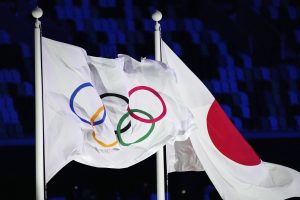Since March 2020, when Japanese Prime Minister Abe Shinzo and the International Olympic Committee (IOC) officially agreed to postpone the Tokyo 2020 Summer Olympics, Japan has experienced a year like none other in Olympic history.
A small but vocal group of activists (both domestically in Japan and internationally) opposed Tokyo’s hosting of the event from the moment the winning bid was announced in 2013, with a wide range of reasons for their opposition. Many were concerned over serious environmental, public health, social, and economic issues that needed to be addressed after the 2011 Tohoku earthquake, tsunami, and nuclear plant meltdown, as money and attention were diverted away from cleanup efforts in northeastern Japan and into Tokyo’s Olympic infrastructure improvements. Others objected to broader forces of gentrification and the displacement of marginalized populations that accompany virtually all sports mega-events. The superstitious among Japanese, including former Prime Minister (and one-time Olympian) Aso Taro, declared the Tokyo 2020 Olympics to be cursed, with so many public gaffes and controversies arising in the planning process.
After the postponement was announced in March 2020, the small group of activists opposing the Olympics dramatically expanded to include a broad coalition of people and institutions voicing concern over the Olympics moving forward when the COVID-19 pandemic remained an issue of global concern. Despite the global and domestic outcry, the IOC and the Japanese Organizing Committee did not cancel the event and a somewhat somber Opening Ceremony took place without incident on July 23. Sounds of protesters outside the nearly-empty stadium could be heard, and the daily COVID-19 count among Olympic athletes, Olympic affiliates, and the general public in Japan has continued to rise.
Whether the event will be remembered as the beacon of harmony and togetherness that organizers hope for, or as a misguided public health disaster, remains to be seen. We do know that Tokyo’s postponed 2020 Olympics will be remembered for more than just the incredible acts of athleticism we see online and on television (unlike Tokyo’s 1964 Olympics, very few spectators can watch the events live). Commentators have already dubbed these the “Coronavirus Games.”
While the Olympics are always “more than just games,” Japan’s involvement with the Olympic Movement over the past century and up to the present day has been laden with meaning and significance and can tell us much about the nation’s broader concerns and ambitions.
While officials could not have predicted that Japan would become the first-ever host country to have its Olympic Games postponed, Japan is a nation with a long history of “firsts” within the Olympic Movement. After the modern Olympic Games began in 1896 as an entirely European-American, male-only event, in 1909 Japan became the first Asian country to have a member serve on the IOC. Shortly thereafter it became the first Asian country to send male athletes to the Olympics in 1912, and a female athlete in 1928 (a Japanese woman won a silver medal in the first-ever 800 meter track race for women at the Olympics).
Japan was the first Asian nation chosen to host the Olympics in 1940, though it ultimately forfeited that right (and the 1940 Games were eventually cancelled altogether). In the wake of World War II, Tokyo again won the right to host the Summer Games in 1964. Japan was the first Asian nation to host the Winter Olympics in Sapporo in 1972, the first to host a second Winter Olympics in Nagano in 1998, and it launched several more failed bids before becoming the first Asian nation to host its second Summer Olympics with the winning 2020 bid.
These pioneering roles and near-constant desire to host the event beg the question: Why has Japan been so fixated on the Olympic Movement since the event began?

































